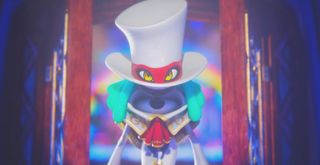Sonic creator Yuji Naka goes nuclear: 'I don't think Square Enix cares about games'
Super Sonic Blastman returns!

Yuji Naka, the celebrated game designer best-known for his years at Sega and as the head of Sonic Team, has posted an extraordinary condemnation of Square Enix and its approach to making games. The remarks, posted to Naka's social media account and here reproduced through an edited machine translation, relate to the development of the troubled Balan Wonderworld, and follow Naka bringing a lawsuit against the publisher for his treatment.
Some brief context on the game: Balan Wonderworld was announced in 2020 as a fantastical new 3D platformer from the creative minds behind NiGHTs and Sonic. Less than a year later, the game launched to disastrous reviews (it currently stands at 38% on Metacritic), and shortly afterwards it was announced Naka was to leave Square Enix.
At the time Naka seemed rather dejected and even considered giving up altogether: "I can't talk about the reason now," he said then, "but I hope I can talk about it when the time comes. As for future activities, I'm 55 years old, so I may retire."
Well, the time has come.
バランワンダーワールド発売の約半年前にバランワンダーワールドのディレクターから外される業務命令が出されましたので、スクウェアエニックスに対して裁判所で訴訟を提起していました。裁判が終わり業務命令が現時点で効力は失われていると言う事ですので、お話したいと思います。#BalanWonderworld pic.twitter.com/9KE7hLqforApril 28, 2022
"Approximately half a year before the launch of Balan Wonderworld," writes Naka, "I was removed as the director of the game, so I filed a lawsuit against Square Enix in court. I would like to talk now that the suit is over and the company rules are no longer in effect.
"I don't think Square Enix cares about games and game fans. According to the court documents, I was removed as the director of Balan Wonderworld for two reasons."
Naka goes on to say that the producer, head of marketing, head of sound, and managing director pushed him out. The first reason given was that, when a piece of promotional material used a Youtuber's cover arrangement of one of the game's songs, Naka then insisted on the release of the original music as well.
The biggest gaming news, reviews and hardware deals
Keep up to date with the most important stories and the best deals, as picked by the PC Gamer team.
Secondly, Naka says he was accused in the court documents of causing trouble with partner developer Arzest by complaining about their submission of a build where certain bugs were not fixed. Naka names Square Enix producers Naoto Oshima and Noriyoshi Fujimoto as saying he'd "ruined" the working relationship through such comments, and references an email from Oshima to Fujimoto—in which, Oshima recounts telling the staff about a delay relating to a demo, and crediting Fujimoto for the delay.
"When I told them," wrote Oshima, "the staff applauded and cheered. I was impressed because it was unexpected. Recently, the staff whose spirits have been sinking have revived. Thank you very much, all the staff will do their best."
Weird, Naka thinks: the original schedule being too tight was down to Fujimoto, and he's taking credit for a minor delay. "Something is wrong," Naka writes, "isn't it?"

Naka writes "that a game is made by striving to make it a good game until the end, and wanting players to enjoy it when they buy it. It wasn't right to remove a director without consultation from the project for making such comments."
Naka says that as a result of the subsequent suit he couldn't react to anything relating to the game on social media at the time: "There were a lot of comments and very nice illustrations of Balan Wonderworld, and I'm really sorry that I couldn't respond to them."
"I'm really sorry to the customers who bought the unfinished Balan Wonderworld," he writes. "[...] When I'm making a game, I think it's natural to make constant corrections in order to make a good one, and if that's not possible, I think it still has to be discussed, but that doesn't seem to be the case. I don't think Square Enix cares about games."
"With Sonic the Hedgehog, it was changed two weeks before the master so you will not die if you have even one ring. To reach this decision I was trying to improve the game to the last minute, and I think everyone in the world is still enjoying it."

Naka writes that improving games until the very last moment "is what being a game designer is all about." He says he asked a lawyer to negotiate his ability to comment on the game's production, but Square Enix refused, which is why he chose to file court proceedings.
"I think this situation has a lot to do with the ensuing Balan Wonderworld, and the bad reception everyone knows about. I'm really sad that a game I worked on from the beginning turned out in such a way."
"Personally, I'm really sorry that I released the unfinished work Balan Wonderworld to the world," ends Naka. "My intention with the game was to put it out in a proper form as an action game. But I think Square Enix and Arzest are companies that don't care about games and players."
Pretty incendiary stuff, especially from a director that has played such a prominent role in videogame history. Perhaps one final bit of context is necessary, which is that Naka has some form with mis-managed projects: perhaps most infamously, Rodea the Sky Soldier (which was released four years after development was finished). His studio Prope, which Sega helped fund, now consists of one employee: Yuji Naka.
Then again, no-one ever sets out to make a bad game, and so often the bad ones feel like there was something there the developers were trying to reach for—but just fell short. One would think that's because it's such an iterative process, and what Naka says about that constant improvement will surely resonate with his fellow designers.
I've reached out to Square Enix for comment and will update with any response. Whatever the full story behind Balan Wonderworld was, the detail about Naka having to take the publisher to court in order to say his piece doesn't look good in the slightest. Game development is messy and hard: in this case, it looks like it also got nasty.
Rich is a games journalist with 15 years' experience, beginning his career on Edge magazine before working for a wide range of outlets, including Ars Technica, Eurogamer, GamesRadar+, Gamespot, the Guardian, IGN, the New Statesman, Polygon, and Vice. He was the editor of Kotaku UK, the UK arm of Kotaku, for three years before joining PC Gamer. He is the author of a Brief History of Video Games, a full history of the medium, which the Midwest Book Review described as "[a] must-read for serious minded game historians and curious video game connoisseurs alike."
Most Popular





